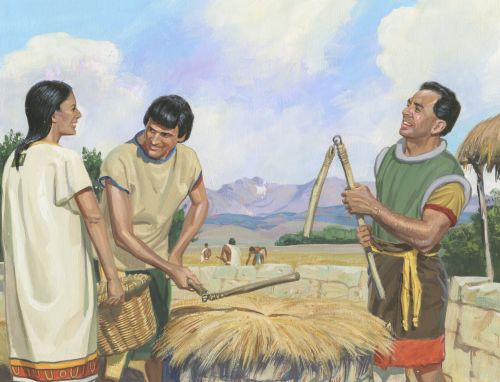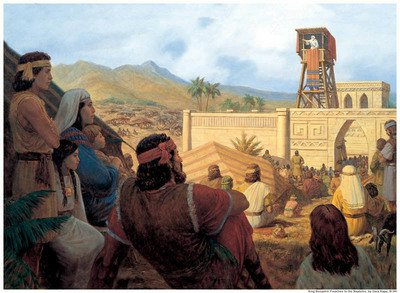For many in our modern world, the word hope comes with a hint of uncertainty, hoping for something, that we may already believe is unlikely to happen. However, in the Gospel of Jesus Christ hope is described as “…firm hope…” (Alma 34:41) and a “…lively hope…” (1 Peter 1:3). Hope is unwavering and sure.
Hope comes through faith, for “…faith is the substance of things hoped for, the evidence of things not seen.” (Hebrews 11:1)
The Prophet Moroni taught “… whoso believeth in God might with surety hope for a better world, yea, even a place at the right hand of God, which hope cometh of faith, maketh an anchor to the souls of men, which would make them sure and steadfast, always abounding in good works, being led to glorify God.” (Ether 12:4)
Hope comes to us by living a life of faith in God.
One can hope for a better world, a better life, peace from a disaster or joy in times of sorrow. However, the first step in finding this peace and joy is by having faith in Jesus Christ. We must rely completely on Him, trusting in His infinite power, intelligence and love.
Following Him, means: Believing and following His teachings, which also means keeping His commandments. Believing that even though we do not understand all things, He does. For “Great is our Lord, and of great power: his understanding is infinite” (Psalm 147:5).
As a follower of Jesus Christ, we become one of His disciples, it is no coincidence that disciple is so similar to the word discipline. Following anything, requires discipline.
Discipline by definition is “control gained by enforcing obedience…” (Merriam-Webster Dictionary). Obedience requires self-control, it requires dedication and a lot of work. The scriptures teach us that “… faith, if it hath not works, is dead, being alone. Yea, a man may say, Thou hast faith, and I have works: shew me thy faith without thy works, and I will shew thee my faith by my works. (James 2:17-18)
Work requires Action.
Our Belief and Faith can be expressed through our Actions – by the way in which we live.
The Savior promised that “If ye will have faith in me ye shall have power to do whatsoever thing is expedient in me.” (Moroni 7:33) Living our lives by faith will motivate us to follow Jesus Christ and His teachings. In fact, Jesus Himself taught that; “He that believeth on me, the works that I do shall he do also; and greater works than these shall he do…” (John 14:12).
As a Disciple of Jesus Christ, not only are we to follow His example, but He encourages us to strive to do even more! Faith in Jesus Christ and in His Gospel helps us to receive physical, spiritual, mental and emotional healing through His Atonement.
He knew that life would not always be easy. He taught us that “…in the world ye shall have tribulation: but be of good cheer; for I have overcome the world.” (John 16:33).
We too can overcome the world.
Speaking to the Romans, the Apostle Paul taught;
“Therefore being justified by faith, we have peace with God through our Lord Jesus Christ: By whom also we have access by faith into this grace wherein we stand, and rejoice in hope of the glory of God. And not only so, but we glory in tribulations also: knowing that tribulation worketh patience; And patience, experience; … because the love of God is shed abroad in our hearts by the Holy Ghost which is given unto us. For when we were yet without strength, in due time Christ died for the ungodly… God commendeth his love toward us, in that, while we were yet sinners, Christ died for us. Much more then, being now justified by his blood, we shall be saved from wrath through him. For if, when we were enemies, we were reconciled to God by the death of his Son, much more, being reconciled, we shall be saved by his life. And not only so, but we also joy in God through our Lord Jesus Christ, by whom we have now received the atonement.” (Romans 5:1-11)
The Apostle Paul knew that we should glory in the difficult times, for these challenges work our patience and give us experience. This experience gives us strength and through Jesus Christ and His Atonement or sacrifice, we too can overcome the world.
Remember, Hope comes through Faith.
Hope can sustain us through everyday challenges.
Hope can provide us with joy in this life, for “Happy is [them]… whose hope is in the Lord his God” (Psalm 146: 5).
We must strengthen our faith through our discipleship, and “…press forward with a steadfastness in Christ, having a perfect brightness of hope, and a love of God and of all men. Wherefore, if ye shall press forward, feasting upon the word of Chris, and endure to the end, behold… Ye shall have eternal life.” (2 Nephi 31:20)







